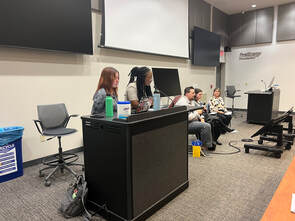 Photo from Macy Rosen, Web & Social Media Co-Manager Photo from Macy Rosen, Web & Social Media Co-Manager By: Sarah Petrovich Success in the workplace goes beyond skills and dedication. Rather, it is a combination of being an advocate for yourself and your colleagues. Three guests joined PRSSA Kent to discuss how to practice self-advocacy, navigate your true identity in the workplace and maintain an inclusive and accepting work environment or more commonly known as Diversity, Equity, Inclusion and Belonging (DEI&B). Emma Weihe, an accessibility specialist at Kent State, aids students by communicating what accommodations would work best for their given disability. Zachary Strickler, the neurodiversity coordinator at Kent State, works to create a better atmosphere for students who face neurodiverse challenges. Our third speaker, Dr. Mary Ann Devine, is a professor at the College of Education, Health, and Human Services at Kent State. She focuses on Disability Studies and Community Inclusion. She wrote a book titled Inclusive Leisure, which advises people to, “look at what they can do, not what they can’t do.” Devine’s perspective and expertise was aligned with the employer and ADA during our discussion. Common Discrimination Cases When talking about some of the most common cases of discrimination in the workplace, Strickler highlighted that different industries experience discrimination in different ways. For instance, higher education has difficulty accommodating scheduling, factory work lacks mobility related accommodations and hospice care is an overall “non-accomodating” occupation. Devine explained how to open up conversations in the workplace while remaining respectful. She said individuals who do not have a disability are often hesitant when working with individuals who do, but two ways to take action against biases are to navigate company objectives that are inclusive of disabled people and to take a disabled individual's life into perspective. Another key point Weihe highlighted is that disclosing accommodations at the stage of interviews is critical. Her mindset is that disclosing a disability is a great way to establish a connection with the company during the interview. It can be, in her words, “meaningful.” “Advocacy is a way of knowing and honoring your boundaries,” Weihe explained. “Recognize that you cannot have all of the answers, and that asking for help is a natural part of the process.” Interactive Session Towards the end of the meeting, an interactive session took place where each speaker created a scenario about discrimination in the workplace. Attendees analyzed each scenario and determined the best possible outcomes. This allowed members to experience the importance behind handling accommodations for disabled individuals seriously. “They feel stigmatized from high school; they want to shed that when they come to college,” Devine said. The best way to diminish this is to try eliminating the stigma overall and focusing on tackling work in a way that uniquely fits the disabled individual: “It is not less than, just different.” Weihe also emphasized that her office offers Accessibility Letters for students who choose not to discuss their disability. These letters remain confidential to the student, Student Accessibility Services and the instructor. Strickler closed with how to address accommodations to individuals who are showing signs of needing them. He believes that it is crucial to have conversations with these people, even if they are resisting. “The easiest way to get somebody on your side is to talk to them directly,” Strickler notes. Staying silent has bigger consequences than having a tough discussion. A final note from Devine was for senior leadership to accept diversity and welcome these individuals into the workforce. Her attitude is that creating a culture where everyone is valued “reduces cost in company,” and is beneficial because “turnover is expensive.” Creating a DEI&B safe atmosphere should be a vital part of any company’s public relations strategy as creating good or bad brand image can make or break a company. This conversation provided students an abundance of insight on how to tackle the workforce in a respectful way. "I learned about the importance of knowing your limits," said Lydia McSwain, a sophomore advertising major. "I believe it was Emma Weihe who said that it can be hard to be 'vulnerable' at times, but self-advocacy is recognizing the importance of representing yourself and making sure your needs are met."
0 Comments
Leave a Reply. |
Archives
February 2024
Categories
All
|
 RSS Feed
RSS Feed
